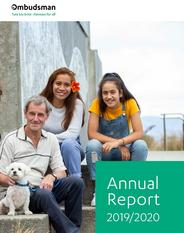Chief Ombudsman Peter Boshier says holding government to account is never more important than in a time of crisis.
Mr Boshier says the highlight of the year ending 30 June 2020 was managing a busy, and expanding, programme of work, while providing independent oversight of the impact of government actions to combat COVID-19.
“The pandemic which swept the world in 2020 is undoubtedly the defining event of the past year. It has also further defined the role of Ombudsman.”
Mr Boshier says the need is stronger than ever to encourage public trust in government by making sure people are treated fairly.
“The fact that I was able to continue to operate seamlessly for the most part during this period is an immense credit to my staff, and I am hugely proud to lead such a professional group of people.
“I met almost all my key performance measures across all work areas, with some exceptions, mainly where I needed to re-prioritise work in response to COVID-19.
“The Government’s response to the pandemic required me to quickly change my focus in some areas. Within three weeks of the Level 4 lockdown, I announced my intention to commence COVID-19 focused inspections of prisons, mental health facilities, and private sector aged care facilities.”
Mr Boshier noted that being confirmed as an essential service by the government within weeks of the initial lockdown was critical for much of the work that needed to be done.
“I also began planning inspections of the managed isolation and quarantine facilities for people arriving from overseas.”
The Ombudsman also dealt with a large number of complaints raising new issues, such as concerns about the handling of applications for border entry exceptions and exemptions from managed isolation and quarantine.
Mr Boshier says another area of significant progress was the formation of Pūhara Mana Tangata, a panel made up of senior and up and coming Māori leaders, to provide guidance on engagement with Māori.
“I mentioned in last year’s report that a top priority was to improve my relationship with tangata whenua. It was my pleasure during the year to attend several regional hui about strengthening oversight of the children in care system, alongside the Independent Children’s Monitor and the Children’s Commissioner.”
Mr Boshier says other highlights included my work internationally, especially in the Asia/Pacific region.
“In the first half of the year, I hosted an investigator training workshop for Pacific Ombudsmen, as well as the inaugural Pacific Ombudsman Leadership Forum. In lockdown, and with borders closed, I switched to online networking with my Pacific peers and colleagues around the world. I organised several virtual workshops attended by participants from a wide range of countries.”
Mr Boshier said the impact of COVID-19 will be with us all for many years to come and will manifest itself in many different ways.
“Transparency, accountability, openness, and fairness are never more important than in a time of crisis. I am committed to making sure that work across the public sector and beyond is carried out fairly, transparently and with accountability.”
Find the Annual Report 2019/20
Selected highlights
• First equal (with Denmark) on the Transparency International Corruption Perceptions Index.
• Visited 84 places of detention (prisons and some other places where people are not free to leave at will), including 59 formal inspections
• Completed 70 percent of all complaints within three months, 85 percent within six months, and 95 percent within 12 months.
• Published 252 new or updated guides and case notes.
• Twenty-two percent more visitors to the Ombudsman website.
• 77 percent public awareness of the Ombudsman
Reports published
1. Making Disability Rights Real 2014- 2019, Whakatūturu Ngā Tika Hauātanga.
2. Off the Record: an investigation into the Ministry of Health’s information about the deaths of people with intellectual disabilities.
3. Official information practices of Tasman District Council, Greater Wellington Regional Council, Christchurch City Council, Auckland Council, and the Far North District Council.
4. Summary of OPCAT inspections of 46 units in nine prisons in Auckland, Wellington and Christchurch during Alert Level 3.
5. Report on inspections of mental health facilities during the lockdown.
Source: Office of the Ombudsmen of New Zealand

